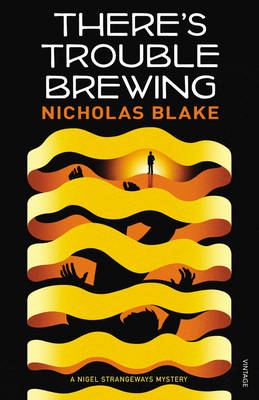
EURO CRIME
Reviews

Blake, Nicholas - 'There's Trouble Brewing'
Paperback: 320 pages (May 2012) Publisher: Vintage ISBN: 0099565374
"Truffles, like everything else that Eustace Bunnett had to do with, was kept very much at heel. One might have supposed that a wife, a brother, a brewery and a town council would have provided Mr Bunnett with sufficient exercise for his lust for power. But that would be to underestimate...the late (though far from lamented) Eustace Bunnett."
This is a Vintage edition of a 1937 classic by Nicholas Blake, featuring his poet-detective Nigel Strangeways (who appeared most famously in the following year's THE BEAST MUST DIE). There are four titles out now, all with excellent covers by La Boca (and twelve more available as print-on-demand).
THERE'S TROUBLE BREWING opens with the murder of a dog belonging to an eminently dislikeable brewery owner. Truffles is boiled away to bones in a 'copper' in Bunnett's brewery in the Dorset town of Maiden Astbury.
A little later, Strangeways is invited to speak at the town's literary society by Sophie Cammison, the wife of an old friend. At the meeting, Nigel meets all the chief players in the ensuing drama: Eustace Bunnett, who is disliked by everyone, not least by his harried wife; Gabriel Sorn, a would-be surrealist poet and apprentice brewer; Miss Mellors, looking like the 'Goddess of Public Works'.
Bunnett is aggrieved rather than grieved by Truffles' death: "The animal was my property, Mr Strangeways". He tells, rather than asks, Strangeways to investigate, and the poet reluctantly agrees for the sake of his friends the Cammisons.
The following day, whilst waiting for Bunnett, Strangeways is given a wonderfully-described tour of the brewery. Just as he is about to leave, Bunnett's absence is explained when a grisly discovery is made in one of the 'coppers'. Strangeways, it seems, will be investigating the mysterious deaths of both dog and master.
If you have only read the more sombre THE BEAST MUST DIE, this title will surprise with its light tone and witty flourishes. Nicholas Blake was, in his day job, a poet (and from 1968 the UK's Poet Laureate) and this shows in some wonderful descriptive passages:
"Sophie Cammison's fingers paused a moment in their knitting. When they commenced again, it was unlike their usual mechanical movements, Nigel thought: it was as though she had flashed a message to them - Go on! Knit, I tell you. Knit!"
The prose is much better than the plot, which is inventive enough, but bound by the conventions of the time. Much of it must have written itself:
Rustic local bobby? Check.Distrustful local police inspector? Check.
Amateur detective working/competing with the police? Check.
Little timetable of alibis? Check.
Eccentric will? Check.
Red herrings? Check.
Bluff chap-to-chap discussion of abnormal psychology? Check.
Consideration of travel times? Check.
The character of Strangeways isn't quite successful. He is the classic gentleman-amateur sleuth and little more. We first meet him with his new wife Georgia, engaging in an affectionately insulting conversation over breakfast. This warmth is not carried through into his investigation. He certainly displays little sympathy towards the victim:
"Eustace Bunnett was better dead - there could be no doubt about that, and Nigel had no desire to hound down the person who had eliminated him."
He is also a snob. People are fine in their place, but when they start climbing they're in trouble.
"That "sir", and a touch of commonness in Mrs Bunnett's accent - quite different from the timid but ladylike tones of last night - startled Nigel."
Strangeways is partially redeemed by his sense of humour - the book is full of one-liners - and by his friendship for the Cammisons. More of this and less of the alibis would have made this a much better book.
I spotted a handful of proofing errors, most seriously Strangeways' wife Georgia is called Georgina in the adverts for other books in the series.
Ultimately: Could (and did) do better, but this is an enjoyable and frothy read, which I'd recommend if you enjoy Michael Innes, Edmund Crispin or, more recently, L C Tyler.
Rich Westwood, England
October 2012
More European crime fiction reviews can be found on the Reviews page.
last updated 3/11/2012 10:48